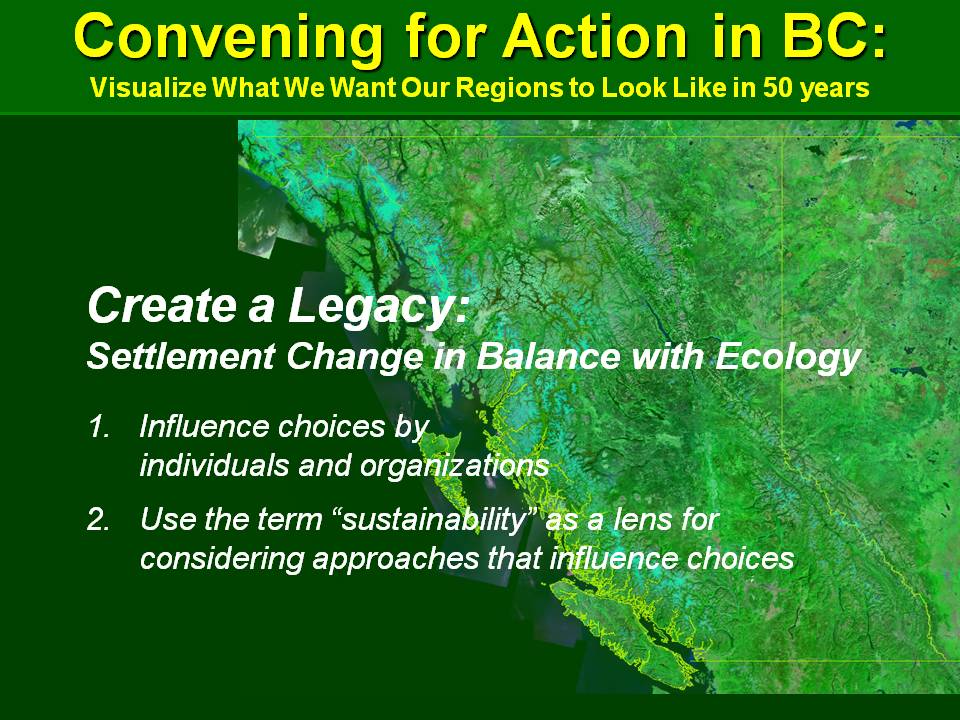Partnership for Water Sustainability champions “Convening for Action in British Columbia”
Integration of Land Use Decisions and Water Sustainability Outcomes
The Partnership for Water Sustainability in British Columbia primarily works in the local government context, with a focus on community and regional planning systems, to influence uptake of strategies that will integrate decisions about use and conservation of land with water sustainability outcomes.
Incorporated as a non-profit society in November 2010, the Partnership promotes and advances protection and management of natural and engineered water resources in British Columbia through further evolution and delivery of program elements developed under the umbrella of the Water Sustainability Action Plan for British Columbia, including: the Water Balance Model decision support tool, the Water Bucket website, and the Convening for Action in British Columbia initiative.
Tim Pringle is the Partnership President. Recently retired as Executive Director of the Real Estate Foundaton of British Columbia, in 2010 he was the inaugural winner of British Columbia’s Land Champion Award.
Convening for Action in British Columbia
“The Partnership is helping to implement the Province’s Living Water Smart and Green Communities initiatives on the ground by building on the existing Action Plan foundation, and connecting the dots between our use of land and the consequences for water sustainability,” states Tim Pringle.
“The Partnership had its genesis in the Water Sustainability Committee, known by the acronym WSC, of the BC Water & Waste Association. From 2003 through 2010, the  WSC was the hub for a partnership network operating in the local government setting. Going forward, the Partnership is now that hub. The partnership network shares a commitment to implementing the Water Sustainability Action Plan. Under this umbrella, the strategy for leading and implementing change is called Convening for Action in British Columbia.”
WSC was the hub for a partnership network operating in the local government setting. Going forward, the Partnership is now that hub. The partnership network shares a commitment to implementing the Water Sustainability Action Plan. Under this umbrella, the strategy for leading and implementing change is called Convening for Action in British Columbia.”
“The Action Plan has delivered ‘convening for action’ programs in three regions: Vancouver Island, Metro Vancouver and the South Okanagan. The ‘twin engines’ of the Action Plan are the Water Balance Model and Water Bucket Website. Both now reside within the Partnership to ensure their long-term sustainability.”
Influence Choices to Create a Legacy
To learn more about the Partnership genesis and desired outcomes in “convening for action” under the umbrella of the Water Sustainainability Action Plan for British Columbia to create a future desired by all, click on the following links:
-
Partnership for Water Sustainability has a role in implementing ‘Living Water Smart, British Columbia’s Water Plan’ — because “Convening for Action” partners are already delivering in two of the five theme areas, namely: community planning and development; and efficiency, outreach, public awareness.
-
BCWWA Water Sustainability Committee was the genesis for the “Partnership for Water Sustainability in British Columbia”, an autonomous society — because the Partnership is the evolution of many initiatives around water sustainability.
-
Partnership for Water Sustainability in British Columbia will build on existing Action Plan foundation — to evolve program elements developed under the umbrella of the Water Sustainability Action Plan.
-
Water Balance Model now resides within the ‘Partnership for Water Sustainability in British Columbia’, a non-profit society — and is one of the ‘twin engines’ driving the Action Plan program that is building leadership capacity in the local government setting.
-
“Partnership for Water Sustainability in British Columbia” incorporated as a society — and has a mandate is to connect the dots between use of land, green infrastructure and water sustainability.
-
Tim Pringle is first winner of British Columbia’s ‘Land Champion Award’ — because he has demonstrated leadership, innovation and collaboration to address issues related to the use and conservation of land in communities, regions, professions, and the province as a whole.

Implementing a New Culture in BC
The ‘Convening for Action’ initiative addresses water sustainability in BC and it engages practitioners whose careers, professions, employment and volunteer roles impact the land. Land and water are inextricably linked and strategies to achieve water sustainability require collaboration and a shared approach among practitioners.
There must be an Outcome
 “When we gather, it is for a purpose. There must be an outcome,” states Kim Stephens, Executive Director. “Talk is not enough… it is the action, the outcome that is important.”
“When we gather, it is for a purpose. There must be an outcome,” states Kim Stephens, Executive Director. “Talk is not enough… it is the action, the outcome that is important.”
“Convening for action as a provincial initiative has evolved over the last five years. We started in the South Okanagan because there was a regional growth strategy and Smart Growth on the Ground in the town of Oliver. We experienced the power of the conversation and how people come together.”
“By 2006, we were ready to go a bigger scale. We said let’s take on a whole region. That became Convening for Action on Vancouver Island. We applied the lessons that we learned in the South Okanagan. We asked the question: what do we want this place to look like in 50 years?”
“It has been one conversation at a time. It is not ‘talking at’ people. It is about facilitating the conversation. Somebody has to provide an excuse to bring people together. Local government people started talking to each other and sharing. We started seeing ripple effects. The land ethic has started to change. It does not happen overnight.”
Link to YouTube Video:
To view Kim Stephens explain ‘convening for action’, click on When we gather it is for a purpose; there must be an outcome
Apply a Regional Team Approach
Since 2003, the Province of British Columbia and the Real Estate Foundation of British Columbia have jointly funded development and implementation of the Water Sustainability Action Plan to build leadership capacity in a local government setting. Under the Action Plan umbrella, a partnership network has successfully demonstrated how to move forward with a ‘regional team approach’ to ensure consistency and ‘do more with less’.
To download a copy of a report that evaluates what has been accomplished on the ground, click on Local Government Talent Can Meet the Challenge Using a Regional Team Approach: Funders’ Report on the Value of the Convening for Action on Vancouver Island (CAVI) Program
CAVI is a principal component of a larger strategy focused on “implementing a new culture for urban watershed protection and restoration in BC,” which was launched by key stakeholders in 1997. To review this history and appreciate CAVI in its broadest context, click on Beyond the Guidebook 2010.
Posted December 2010



